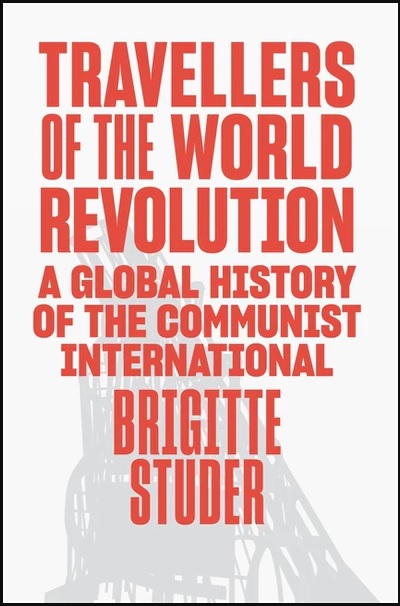Biblioteca / 2020-2029
Brigitte Studer. Travellers of the World Revolution. A Global History of the Communist International.
Londres: Verso, 2023.
384 páginas.
Traducción: Dafydd Rees Roberts.
Edición original: Reisende der Weltrevolution. Berlín: Suhrkamp Verlag, 2020.
Contents
Preface
Introduction
Revolution and Organization
Local Beginnings of a Global Project
Revolution as an Employment
The Global in the Local
Women, Men and the Revolutionary Self
Situated Action
Sources and Structure
1 – Moscow 1920: Revolutionary Rendezvous
Through the Allied Blockade to Soviet Russia
Revolutionary Enthusiasm and the Experience of Transnational Solidarity
The Search for Shared Principles and a Common Language
Revolutionaries of a New Type?
2 – Baku and Tashkent: The Revolution Goes East
The ‘Oppressed Peoples of the East’
Force of Arms, Force of Propaganda: Exporting the Revolution
Modernity and Tradition?
Daily Life in the Early Days of the Comintern Apparatus
3 – Berlin: Bridgehead in Europe and Hub of Transnational Circulation
Transfers of Money and Knowledge
An Early Comintern Agent and His Team
Interacting Apparatuses
An Organ of Party Control in the West
The Working Day on a Foreign Mission
A Rigorous System of Coordination and Supervision
4 – Berlin, Cultural Capital of International Communism
Cosmopolitan Intellectuals
Changing Personnel Policy
Euphoria and Sadness, Integration and Isolation
Between Ascesis and Bohemia
A Communist Entrepreneur
Avant-Garde Culture and Prop-Art
5 – Paris, Brussels, Berlin: Anti-Imperialism and Transcolonial Networks
Anticolonialism Reaches the Metropole
China: New Epicentre of the World Revolution
Building Global Anticolonial Solidarity
From Anticolonialism to Anti-Imperialism
Mobilizing Friends and Sympathizers
Coordination with the Eastern Department
‘Negro Workers’: The Internationalization of the International
6 – Guangzhou and Wuhan: On Missions for the Comintern in China
Disunion and Deadlock
In the New Capital
Communicating the Line
Departure and the Political Consequences of the Debacle
7 – Shanghai: The Perilous Life of the Comintern Agent
Rallying Point for Professional Revolutionaries
Smashing of the Comintern Network
Conspiracy as an Occupation
Sowing Confusion
Improvised Cooperation Between Apparatuses
A Communist Enclave amid the Foreign Concessions
8 – Cities of Refuge: Paris, Basel, Zurich, Moscow
Paris: A Disorganized Effort to Rebuild the Apparatus
Basel and Zurich: Precarious Safety
Moscow: Caught in the Trap
9 – The Last Big Mission: Barcelona, Madrid, Albacete, Valencia
Advent of the Comintern Representatives
Solidarity with the Spanish Republic … and the Revolution
Recruitment and Conveyance of Volunteers
Establishment of a Military Base in Albacete
(Proto-)Humanitarian Aid
Security and Surveillance in Spain
Fatigue and Conflict among the Comintern Advisers
10 – Conclusion: A Life with Bags Packed
Conditions, Duties, Job Requirements
Personality Types, Career Opportunities and Cadre Policy
Violence and Imprisonment
Political Commitment: Gains and Losses
Stalin and the Transformation of the Comintern
The Dead on Leave: The Great Massacre
Aftermath
A Brief Epilogue: The Survivors

